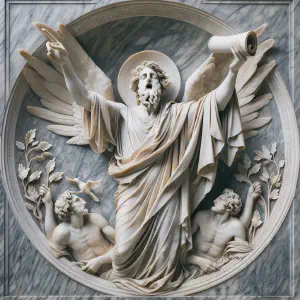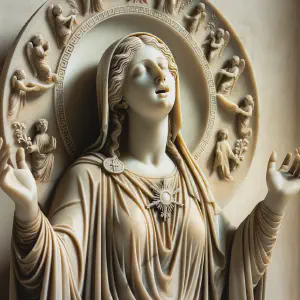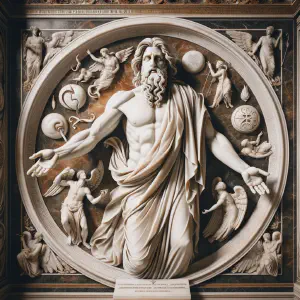Echoes of Divine Hope



In the Gospel according to John, the narrative shifted to a desert where a man named John testified not to himself but to the light, so that all might believe through him. He was not the light but a witness to it, a voice crying in the wilderness urging preparation for the way of the Lord. When questioned by priests and Levites about his identity, he humbly confessed he was not the Christ, Elijah, or the Prophet, but simply a voice for the truth. He baptized with water, yet spoke of one greater among them, one whose sandals he was unworthy to untie. This encounter at Bethany across the Jordan, where John baptized, marked a pivotal moment in the unfolding story of salvation.
Five Questions
What is the significance of the anointing mentioned in Isaiah’s passage?
The anointing in Isaiah represents a divine commissioning, signifying that the individual is chosen by God for a special purpose. In biblical terms, anointing is often associated with being set apart for sacred tasks. Here, it specifically pertains to bringing good news to the poor, healing the brokenhearted, and proclaiming liberty to captives. This anointing also foreshadows the ministry of Jesus Christ, who fulfills these promises.
How does the Psalm from Luke relate to the message in Isaiah?
The Psalm from Luke echoes the themes of joy and salvation found in Isaiah. It expresses gratitude and praise for God’s intervention in the life of the humble servant, Mary. This reflects the broader biblical narrative of God uplifting the lowly and providing for the needy, resonating with Isaiah’s message of hope and restoration.
What does Paul mean in Thessalonians by “rejoice always” and how does this connect with the other readings?
Paul’s instruction to “rejoice always” in Thessalonians encourages a constant state of joy and gratitude in the life of a believer, regardless of external circumstances. This connects with the other readings by emphasizing a persistent and hopeful faith in God’s promises. Just as Isaiah speaks of joy in God’s salvation and justice, and Luke highlights rejoicing in God’s mercy, Paul calls for a continuous celebration of faith in Christ.
What role does John the Baptist play in the Gospel of John, and how does his role relate to the readings from Isaiah and the Psalm?
In the Gospel of John, John the Baptist serves as a forerunner to Jesus, preparing the way for the Lord. His role of testifying to the light (Jesus) aligns with Isaiah’s theme of announcing a new era of God’s favor and the Psalm’s message of acknowledging God’s mighty deeds. John the Baptist’s humility and recognition of Christ as the fulfillment of God’s promises connect the Old Testament prophecies with their realization in the New Testament.
How do these scriptures collectively guide a Christian’s understanding of their faith and purpose?
Collectively, these scriptures guide a Christian’s understanding of their faith and purpose by emphasizing the themes of divine calling, persistent joy, humble service, and the anticipation of Christ’s redemptive work. They encourage believers to see themselves as part of God’s ongoing plan, where each is anointed in their own way to bring hope, practice faith, serve with humility, and rejoice in the Lord’s salvation. This comprehensive view underscores a life committed to embodying the love and justice of God in the world.
Bible Study
Isaiah 61:1-2A, 10-11
The spirit of the Lord GOD is upon me,
because the LORD has anointed me;
he has sent me to bring glad tidings to the poor,
to heal the brokenhearted,
to proclaim liberty to the captives
and release to the prisoners,
to announce a year of favor from the LORD
and a day of vindication by our God.
I rejoice heartily in the LORD,
in my God is the joy of my soul;
for he has clothed me with a robe of salvation
and wrapped me in a mantle of justice,
like a bridegroom adorned with a diadem,
like a bride bedecked with her jewels.
As the earth brings forth its plants,
and a garden makes its growth spring up,
so will the Lord GOD make justice and praise
spring up before all the nations.
This passage features an unnamed prophet, traditionally understood as Isaiah, who plays the role of a messenger anointed by God. The prophet’s mission includes bringing good news to the poor and comforting the brokenhearted, aligning with Catholic values of compassion and social justice. This passage anticipates the coming of Jesus, who fulfills these prophecies. It emphasizes the concepts of liberation and joy in God, resonating with the Catholic emphasis on human dignity, the preferential option for the poor, and the joy found in God’s salvation.
Luke 1:46-48, 49-50, 53-54
R. (Is 61:10b) My soul rejoices in my God.
My soul proclaims the greatness of the Lord;
my spirit rejoices in God my Savior,
for he has looked upon his lowly servant.
From this day all generations will call me blessed:
R. My soul rejoices in my God.
the Almighty has done great things for me,
and holy is his Name.
He has mercy on those who fear him
in every generation.
R. My soul rejoices in my God.
He has filled the hungry with good things,
and the rich he has sent away empty.
He has come to the help of his servant Israel
for he has remembered his promise of mercy,
R. My soul rejoices in my God.
This passage, known as the Magnificat, is a hymn of praise by Mary, the mother of Jesus. Mary serves as a model of humility and obedience to God. Her song reflects Catholic values of humility, mercy, and God’s preferential love for the poor and marginalized. The Magnificat aligns with the Catholic understanding of the Beatitudes, as it celebrates God lifting the lowly and filling the hungry with good things, thereby reflecting the acts of mercy and the Beatitudes’ blessings.
1 Thessalonians 5:16-24
Rejoice always. Pray without ceasing.
In all circumstances give thanks,
for this is the will of God for you in Christ Jesus.
Do not quench the Spirit.
Do not despise prophetic utterances.
Test everything; retain what is good.
Refrain from every kind of evil.
May the God of peace make you perfectly holy
and may you entirely, spirit, soul, and body,
be preserved blameless for the coming of our Lord Jesus Christ.
The one who calls you is faithful,
and he will also accomplish it.
Written by Paul the Apostle, this passage instructs the early Christian community in Thessalonica. Paul, a key figure in the spread of early Christianity, emphasizes rejoicing, prayer, and gratitude, which are central to Catholic life and spirituality. His admonition to ’test everything; retain what is good’ reflects the Catholic approach to discernment and moral conscience. This passage promotes values such as continuous prayer, thankfulness, and the pursuit of holiness, consistent with Catholic teachings on the importance of prayer, gratitude, and sanctification in Christian life.
John 1:6-8, 19-28
A man named John was sent from God.
He came for testimony, to testify to the light,
so that all might believe through him.
He was not the light,
but came to testify to the light.
And this is the testimony of John.
When the Jews from Jerusalem sent priests
and Levites to him
to ask him, “Who are you?”
He admitted and did not deny it,
but admitted, “I am not the Christ.”
So they asked him,
“What are you then? Are you Elijah?”
And he said, “I am not.”
“Are you the Prophet?”
He answered, “No.”
So they said to him,
“Who are you, so we can give an answer to those who sent us?
What do you have to say for yourself?”
He said:
“I am the voice of one crying out in the desert,
‘make straight the way of the Lord,’”
as Isaiah the prophet said.”
Some Pharisees were also sent.
They asked him,
“Why then do you baptize
if you are not the Christ or Elijah or the Prophet?”
John answered them,
“I baptize with water;
but there is one among you whom you do not recognize,
the one who is coming after me,
whose sandal strap I am not worthy to untie.”
This happened in Bethany across the Jordan,
where John was baptizing.
This passage introduces John the Baptist, a pivotal figure in preparing for Jesus’ ministry. John’s role as a witness to the light (Jesus) highlights the Catholic principle of bearing witness to truth and light in the world. His humility and acknowledgment of Jesus’ superiority align with Catholic teachings on humility and recognizing Christ as the center of faith. This passage demonstrates the continuity between Old and New Testament prophecies and the fulfillment of God’s plan in Jesus, a core aspect of Catholic theology.
Lessons
The passages weave a tapestry of hope, joy, and humility in the Lord. Isaiah speaks of a divine anointing for a mission of liberation and renewal, symbolizing the transformative power of God’s love and justice. The psalm from Luke celebrates the Lord’s greatness and mercy, emphasizing God’s attention to the humble and needy. In Thessalonians, we are reminded to rejoice always, pray ceaselessly, and embrace the spirit of discernment, highlighting the importance of a grateful and vigilant faith. The Gospel of John introduces us to John the Baptist, a humble servant who, though not the light, dedicates himself to bearing witness to it, embodying the virtues of humility and faithfulness in preparation for Christ. Together, these readings call us to a life of deep faith, unwavering hope, and humble service in anticipation of God’s salvific action in the world.
Meditation Prayer


